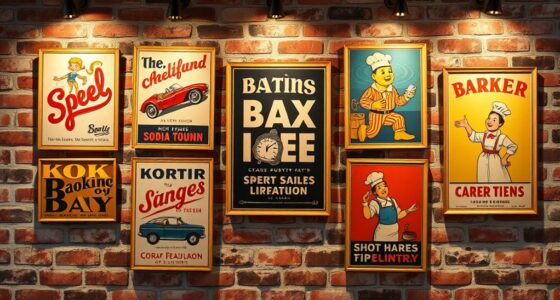Humor works in advertising because it grabs your attention through surprise, unexpected twists, and relatable experiences that create emotional bonds. It helps break down barriers, making brands seem friendly and trustworthy. Funny ads are memorable, stand out from competitors, and encourage word-of-mouth sharing. When brands align humor with their values, they reinforce their identity and foster loyalty. Continue exploring to discover how humor can truly elevate your brand’s impact.
Key Takeaways
- Humor captures attention through surprise and unexpected twists, making ads memorable and emotionally engaging.
- Relatable humor based on shared experiences fosters trust, emotional bonds, and brand loyalty.
- Well-placed humor lowers barriers, creates a friendly atmosphere, and encourages audience interaction.
- Funny advertising enhances memorability and differentiates brands by activating emotional and visual impression.
- Humor builds emotional connections, trust, and loyalty, encouraging sharing and long-term customer relationships.
The Power of Surprise and Unexpected Twists
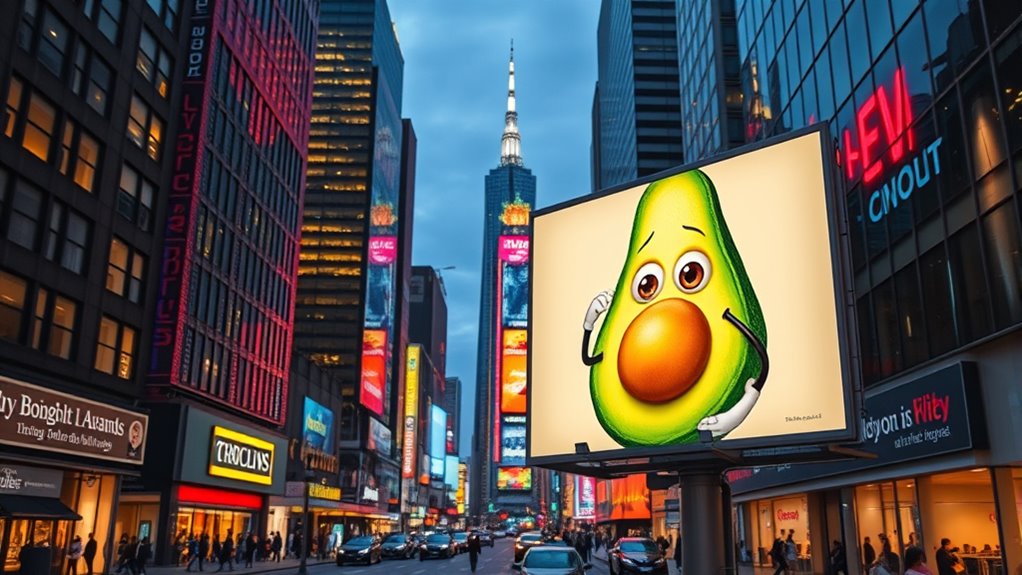
Surprise and unexpected twists are powerful tools in advertising because they grab your attention instantly. When an ad delivers unexpected punchlines, it shocks you out of your routine thinking, making the message memorable. Humorous misdirection keeps you engaged, leading you down one path before flipping the script. This technique creates a sense of delight, as your expectations are subverted in a clever way. Think of ads that set up a familiar scenario and then introduce an unexpected twist that’s both funny and relevant. These surprises not only entertain but also reinforce the brand’s message, making it more likely you’ll remember the ad. When used skillfully, unexpected punchlines turn ordinary ads into unforgettable moments of humor. Developing a growth-oriented mindset helps marketers craft more effective and memorable campaigns that leverage these surprising elements.
Relatability and Shared Experiences

Humor that resonates through shared experiences creates a strong bond between the brand and its audience. When your audience recognizes their own common struggles in your humor, it sparks shared laughter that feels personal and genuine. This connection makes your message more memorable and relatable. Instead of trying to impress with cleverness alone, you show understanding of everyday challenges, from busy mornings to frustrating tech issues. When people see their experiences reflected in your ads, they feel seen and understood. This shared laughter fosters trust and loyalty, making your brand more approachable. By tapping into relatable situations, you turn ordinary moments into humorous, memorable stories that strengthen your relationship with your audience. Incorporating essential oils for common concerns into your messaging can further deepen this connection by addressing familiar health issues in a friendly, approachable way.
Breaking the Ice and Lowering Barriers

Humor can quickly ease audience tension and make your message feel more approachable. It sparks curiosity and invites people to engage without feeling judged. By creating a friendly atmosphere, you lower barriers and encourage genuine connections. Additionally, pop culture references enhance relatability and keep your content engaging.
Eases Audience Tension
Have you ever noticed how a well-timed joke can quickly make an audience feel more comfortable? Humor creates a light-hearted tone that relaxes tension, helping people let their guard down. When your message is delivered with a bit of wit, it transforms a formal or tense environment into a more approachable space. This relaxed atmosphere encourages engagement and openness, making your audience more receptive to your ideas. Instead of feeling scrutinized or defensive, they enjoy a moment of shared amusement. Humor acts as a social lubricant, easing nerves and breaking down barriers effortlessly. Incorporating humor strategically can also boost audience retention and recall, making your message more effective in advertising. By setting a friendly tone that invites connection and trust, you ultimately make your advertising more memorable and effective.
Sparks Curiosity Quickly
Ever wonder how a clever joke or witty remark can instantly grab attention? It’s all about using unexpected humor to trigger curiosity. When your ad surprises viewers with a funny twist or a playful punchline, it breaks the ice and lowers barriers right away. This kind of humor sparks curiosity because it prompts people to ask, “What’s next?” or “How did that happen?” Instead of sticking to predictable messages, you introduce an element of surprise that makes your audience lean in and pay closer attention. By triggering curiosity quickly, your ad becomes memorable and encourages viewers to engage further. Incorporating creative storytelling techniques, such as humorous quotes, can make your message even more impactful. This approach turns a simple joke into a powerful tool for opening conversations and making your brand stand out from the competition.
Creates Friendly Atmosphere
Using humor in advertising easily creates a friendly atmosphere by breaking the ice and making your brand approachable. When you use a lighthearted tone and approachable language, you lower barriers that might otherwise intimidate potential customers. Humor helps people feel at ease, encouraging them to engage with your message without feeling pressured. It fosters a sense of shared experience, making your brand seem more relatable and trustworthy. By making your audience smile or laugh, you create positive associations that make it easier to connect on a personal level. This relaxed environment encourages conversations, invites loyalty, and builds long-term relationships. Ultimately, humor transforms your advertising into a welcoming space where customers feel comfortable and valued. Incorporating appropriate humor thoughtfully can also help manage emotional reactions and foster a positive perception of your brand.
Enhancing Memorability Through Humor
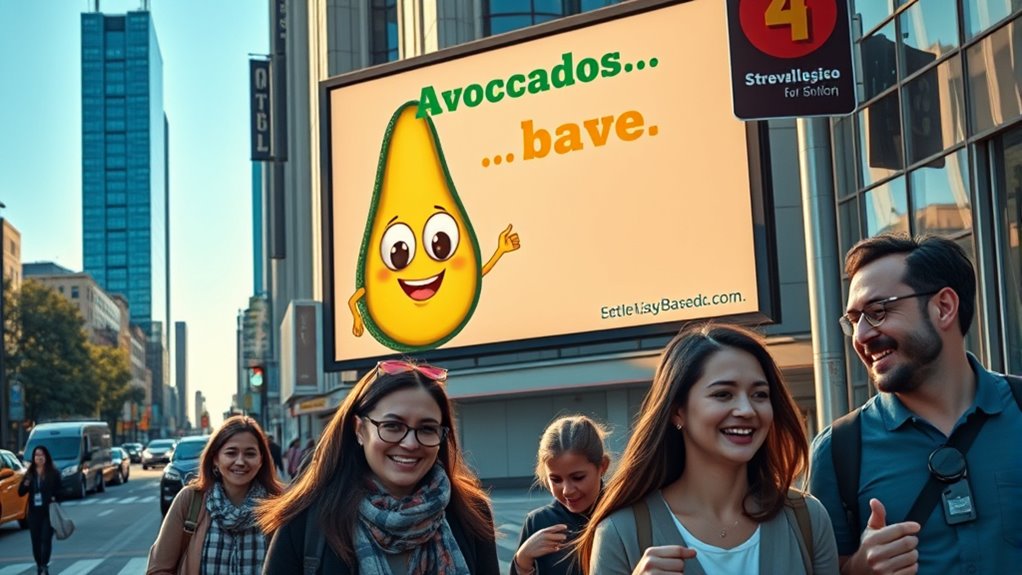
Humor can make your ads more memorable by boosting brand recall so people remember you longer. It also creates an emotional connection, making your message more relatable and impactful. Plus, funny ads often spark word-of-mouth, spreading your message organically through conversations. Incorporating visual appeal—such as clever imagery or engaging design—can further enhance the effectiveness of humorous advertising.
Boosts Brand Recall
Have you noticed how funny ads tend to stick in your mind longer than serious ones? That’s because humor enhances your visual memory, making images and messages more memorable. When a joke or witty remark captures your attention, it creates a strong cognitive impact, anchoring the brand in your mind. Humor activates your brain’s emotional centers, making the ad more engaging and easier to recall later. This increased memorability isn’t accidental; it’s a strategic advantage for brands aiming to stand out. When you laugh at a clever tagline or funny visual, you’re more likely to remember the product or company behind it. Humor doesn’t just entertain—it reinforces brand recall by creating a lasting impression in your memory. Additionally, employing leadership qualities such as strategic thinking in advertising can further enhance the effectiveness of humorous content by aligning it with brand goals.
Creates Emotional Connection
When humor resonates with you, it does more than just make you laugh—it fosters an emotional bond with the brand. This emotional resonance deepens your connection, making the message more memorable. Humor breaks down barriers, encouraging genuine audience engagement and trust. When a brand uses humor effectively, it taps into your feelings, making the experience feel personal rather than transactional. That positive emotional response sticks with you, increasing the likelihood you’ll remember the ad—and the brand—long after viewing. Humor creates a shared moment of joy, strengthening your relationship with the brand beyond mere recognition. Additionally, emotional alignment plays a crucial role in amplifying the impact of humor on consumer perception. As a result, your emotional connection becomes a powerful tool in building brand loyalty and loyalty that lasts.
Sparks Word-of-Mouth
Because humor often elicits strong emotional reactions, it encourages you to share ads with friends and family, sparking word-of-mouth buzz. When humor feels authentic, it resonates more deeply, making your audience more likely to pass it along. Clever satire and social commentary add layers of meaning, prompting conversations and debates that extend beyond the initial impression. These elements make your ad memorable, as people enjoy discussing its cleverness or social relevance. Humor that aligns with genuine brand voice builds trust, increasing the likelihood of sharing. Additionally, understanding IRA tax implications can help you craft messages that connect with audiences planning for retirement, making your content more relevant and impactful. By combining humor, authenticity, and insightful social commentary, your ads become more than just funny—they become memorable cultural moments that drive organic buzz and expand your reach organically.
Creating Emotional Connections With Audiences

Creating emotional connections with audiences is essential for making advertising memorable and impactful. When your message resonates emotionally, it fosters a deeper sense of audience affinity, turning viewers into loyal supporters. Humor plays a key role here, as it sparks emotional resonance by making your brand relatable and approachable. You’re not just selling a product; you’re creating shared experiences that evoke feelings of joy, surprise, or understanding. This emotional engagement encourages audiences to remember your message long after they’ve seen it. When viewers feel connected, they’re more likely to trust your brand and develop a positive association. Ultimately, building these emotional bonds through humor helps your advertising stand out and creates lasting impressions that drive loyalty.
Differentiating Brands in a Crowded Market
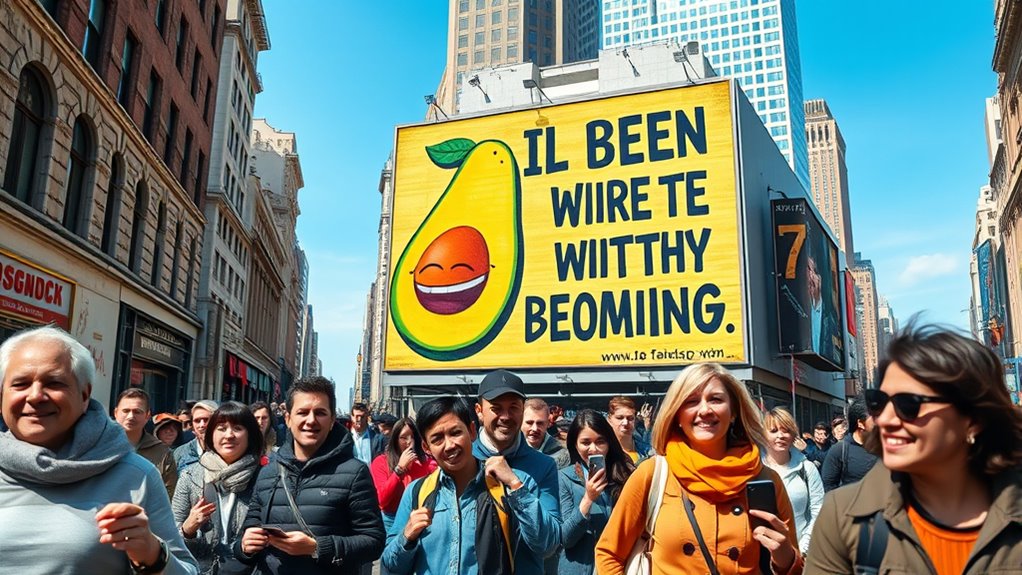
Humor not only fosters emotional connections but also serves as a powerful tool to distinguish your brand amidst fierce competition. When you use humor effectively, you create a memorable brand personality that sets you apart. A witty or playful tone can highlight what makes your brand unique, making it easier for consumers to recognize and remember you. Humor helps break through the noise in a crowded market by making your message more engaging and relatable. By aligning your humor with your brand’s values and voice, you reinforce your identity and strengthen market differentiation. This approach ensures your brand doesn’t just blend in but stands out as authentic, approachable, and distinct—key qualities that attract and retain loyal customers.
Encouraging Word-of-Mouth and Virality
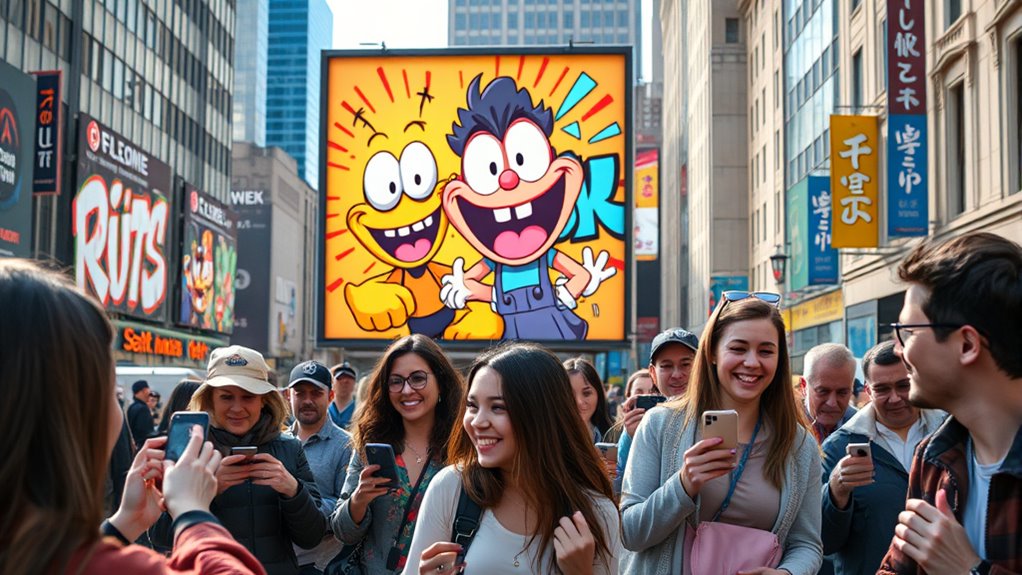
Have you ever wondered what makes some ads spread rapidly across social media? Humor plays a vital role in encouraging word-of-mouth and virality. Funny ads are more likely to be shared because they evoke positive emotions and entertain viewers. When your content makes people laugh, they feel compelled to pass it along, boosting social sharing. This viral spread helps your message reach a much larger audience without extra advertising costs. Humor also makes your brand memorable, increasing the chances that people will talk about it later. By creating content that entertains and amuses, you tap into the natural human desire to share funny moments. Ultimately, clever humor fuels organic growth, turning viewers into ambassadors who spread your message far and wide.
Reinforcing Brand Identity and Values
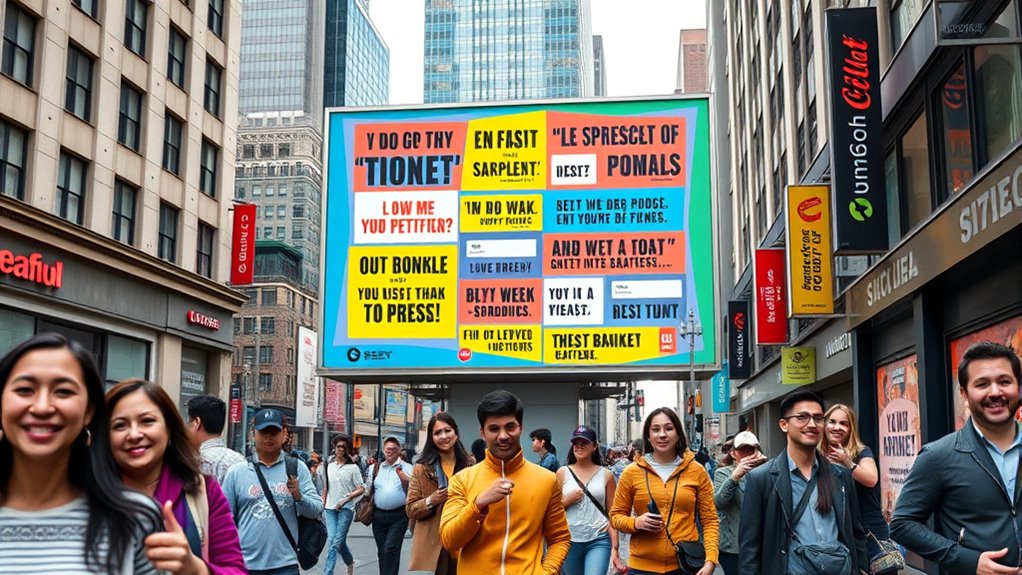
When you incorporate humor into your advertising, it can effectively reinforce your brand’s core identity and values. Humor creates a memorable connection that highlights your brand’s personality and fosters brand consistency. When your jokes align with your brand’s voice and message, it strengthens value alignment, showing customers what you stand for. Consistent humor that reflects your brand’s ethos helps build trust and recognition, making your brand more relatable. By reinforcing your values through humor, you demonstrate authenticity and commitment to what matters most to your audience. This approach not only makes your advertising more engaging but also reinforces how your brand behaves and connects emotionally, ensuring your brand identity remains clear and unified across all channels.
Frequently Asked Questions
How Does Humor Influence Consumer Decision-Making Processes?
Humor influences your decision-making by creating an emotional connection with the brand, making it memorable and likable. When an advertisement makes you laugh, you tend to view the brand more positively, improving brand perception. This emotional bond increases your trust and reduces skepticism, encouraging you to choose that brand over competitors. Ultimately, humor makes your decision easier by making the brand stand out and evoke positive feelings.
Can Humor Backfire and Harm Brand Reputation?
Did you know that 60% of consumers say offensive humor can harm a brand’s reputation? Humor can backfire if it crosses the line into offensive humor or disregards brand sensitivity. When you use humor carelessly, it risks alienating your audience or damaging trust. To avoid this, stay mindful of your message, guarantee your humor aligns with your brand values, and always consider how your audience might perceive it.
What Cultural Considerations Are Important in Humorous Advertising?
When creating humorous advertising, you need to take into account cultural sensitivities and regional humor to avoid missteps. What’s funny in one culture might offend in another. You should research local customs, avoid stereotypes, and tailor jokes to resonate with your target audience. By respecting cultural differences, you guarantee your humor connects positively, enhances brand perception, and prevents potential backlash that could harm your reputation.
How Do Brands Measure Humor’s Effectiveness in Campaigns?
Think of measuring humor’s effectiveness like Sherlock solving a mystery—you track brand recall and emotional engagement. You can analyze metrics such as social shares, comments, and surveys to see if your audience remembers your ad and feels connected. A/B testing different humorous elements also helps you refine your approach. By focusing on these indicators, you guarantee your campaigns not only entertain but also boost brand loyalty and recognition.
Is Humor Suitable for All Types of Products or Services?
You might wonder if humor suits all products or services. It really depends on product appropriateness and audience suitability. For example, humor works well for casual, lifestyle, or entertainment brands, but may not fit more serious or professional services. You should consider your target audience’s preferences and sensitivities. When used correctly, humor can boost engagement, but if misaligned, it risks damaging your brand’s credibility.
Conclusion
You might think humor isn’t serious enough for branding, but it’s actually a powerful tool that builds connections, makes your message memorable, and sets you apart. Don’t worry about offending—when done right, humor humanizes your brand and invites engagement. So, embrace the unexpected, share relatable laughs, and watch how humor transforms your advertising into a memorable, shareable experience that resonates deeply with your audience.


